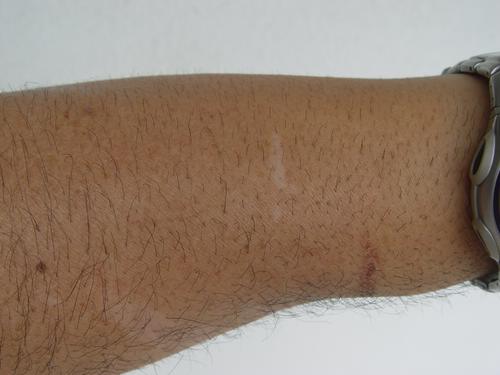(Not So) Distant Early Warning

Using all your senses is important in the kitchen. Like when you reach for a pan on the back burner, you may smell your arm hair being singed off. This is Nature's way of warning you that fire is hot, and you should move your arm.
I've learned is that you can touch almost anything hot if you do it fast enough. The hotter it is, the shorter the amount of time you have. And it may still leave a mark. But the body is more tolerant than I might have thought before I worked in a kitchen. Obviously, I don't recommend going around touching hot things. But here are some examples of things that come up in a cook's workday.
Someone else can explain all the science, but what's at work here is that all materials have a coefficient of heat - how effeciently they conduct heat and energy. Air is the least efficient, water is in the middle, and metals are most efficient.
Open flame is actually one of the most deceiving. Because flame gives off light and is easily visible, to avoid it is one of our most deeply ingrained responses. But as long as you're moving, it's relatively safe to pass one's hand through flames of a burner. Hesitation or slowing down to place something on a burner nicely will get you burned.
For this discussion, there are two kinds of liquids - ones that don't get above 212 degrees, like water, and the ones that do, like oil and sugar syrup. Obviously, if you have boiling water or stock spilled on you, you will get scalded. But if you're moving quickly, you can dip a finger in water to taste if it's been salted, or you can dip a finger a sauce to taste it.
In restaurant kitchens, towels are used as potholders. But once a towel gets wet, it's more likely to burn you than a dry one. It's a little counterintuitive, but it's because water is more efficent at conducting heat than air (trapped in the towel fibers). [A towel with oil or fat on it is also very dangerous. This is a common injury in a kitchen - what usually happens is trying to carry something like food that you don't want to drop, holding the handle tightly, and in the time between wrapping the towel around the panhandle and setting it down, it can burn pretty seriously]
Oil in a deep fryer can be very dangerous. But one of the classic Japanese tempura techniques is to dip the fingers in tempura batter for a bit of protection. Also, with a similar technique they sometimes create little bits of batter that are then gathered and packed onto the tempura itself for a thicker coating. [The other cooks at work also flick water into the deep fryer to tell how hot it is by the sound of how aggressively the water reacts to the oil. Not recommended!]
Sugar syrup and caramel are particularly dangerous because they can get to be up around 400 degrees, they're sticky, and will cling to you while you're being burnt. And you definitely don't want to get it on your tongue. I haven't done this yet, and I don't intend to.
The air in an oven won't burn you if all you're doing is reaching in to retrieve a pan. What will burn almost instantly is anything metal, like the racks or the pan, which are now at the oven temperature usually either 350 or 450 degrees. That's what all those marks on my arm in the picture above are from, mostly from my first month at work.
Aluminum foil, is generally pretty safe to touch in an oven. Say if it's just loosely covering a roast or something, you could just grab it barehanded. But what will burn is the steam it's containing or metal it's wrapped around.
Be careful out there, and move quickly.
Comments
mmm hot sugar on my tongue.. you really should try it.. you're such a wusss!
hey - thanks for the blog update. I was feeling like you didn't care about your faithful readers anymore.
amy.
Posted by: Amyj![[TypeKey Profile Page]](http://www.foodzealot.com/blog/nav-commenters.gif) |
May 1, 2006 08:06 PM
|
May 1, 2006 08:06 PM